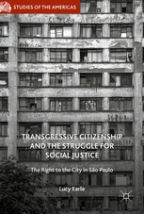Transgressive Citizenship and the Struggle for Social Justice: The Right to the City in São Paulo

Transgressive Citizenship and the Struggle for Social Justice kicks off with a crucial period of activism in São Paulo: the Jornadas de Junho (Days of June) in 2013, a year before the costly and contentious World Cup tournament. The author situates this month of protest within a larger movement for the right to the city. And she describes this as the demand “for decent housing, transport and social services, and for that right to be extended to all, including low-income groups living on the physical and social margins, so that they are able to make the most of what urban life has to offer” (pages 3–4).
This demand is acute in São Paulo, given the city’s massive inequality and insufficient housing stock. It is also a very contested demand, which Earle explores by focusing ethnographically on the activities of the União de Movimentos de Moradia (Federation of Housing Movements). She documents UMM tactics, such as occupying buildings and exploiting legal ambiguities, as well as São Paulo’s history of housing exclusion. But she also tackles broader and more theoretical concerns, including the framing of rights. This preoccupation with rights leads to the book’s core notion of transgressive citizenship: “the way the housing movements shape their relationship with the state through their acts of civil disobedience, combined with a politics of rights” (page 23).
The book follows the legacy of earlier protests to the removal of President Dilma Rousseff in 2016, and the ensuing political chaos. This analysis also explains how largely white, affluent Brazilians, dissatisfied with policies aimed at reducing social inequality, were marshalled into a potent political force. This is sobering to read now, given the ascendancy of right-wing hardliner Jair Bolsonaro to the presidency. And the book feels prescient in its discussion of media distortion and social media mobilization, as influencers of conservative politics in Brazil.
But the book also offers some potential hope for counter-movements. In detailing the creativity and energy of a core network working towards both concrete improvements and a more general renegotiation of their relationship with the city, it suggests that both researchers and activists can learn from the example of transgressive citizenship in São Paulo.
Further reading:
Budds, Jessica with Paulo Teixeira and SEHAB (2005), “Ensuring the right to the city: pro-poor housing, urban development and tenure legalization in São Paulo, Brazil”, Environment and Urbanization Vol 17, No 1, pages 89–113, available at https://journals.sagepub.com/doi/pdf/10.1177/095624780501700105.
Caldeira, Teresa (2013), “São Paulo: the city and its protest”, openDemocracy, 11 July, available at https://www.opendemocracy.net/opensecurity/teresa-caldeira/s%C3%A3o-paul....
Mitlin, Diana (2018), “Beyond contention: urban social movements and their multiple approaches to secure transformation”, Environment and Urbanization Vol 30, No 2, pages 557–574, available at https://journals.sagepub.com/doi/full/10.1177/0956247818791012.
Satterthwaite, David (2008), “Editorial: The social and political basis for citizen action on urban poverty reduction”, Environment and Urbanization Vol 20, No 2, pages 307–318, available at https://journals.sagepub.com/doi/pdf/10.1177/0956247808096114.
Book note prepared by Christine Ro
Search the Book notes database
Our Book notes database contains details and summaries of all the publications included in Book notes since 1993 - with details on how to obtain/download.
Use the search form above, or visit the Book notes landing page for more options and latest content.
For a searchable database for papers in Environment and Urbanization, go to http://eau.sagepub.com/

